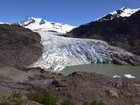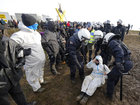The last eight years were the warmest on record even with the cooling influence of a La Nina weather pattern since 2020, the European Union's climate monitoring service said Tuesday.
Average temperatures across 2022 -- which saw a cascade of unprecedented natural disasters made more likely and deadly by climate change -- make it the fifth warmest year since records began in the 19th century, according to the Copernicus Climate Change Service.
 Full Story
Full Story
A German court on Tuesday began hearing a case against Volkswagen brought by climate group Greenpeace to try to compel the giant group to stop selling petrol and diesel cars from 2030.
The plaintiffs, the two heads of Greenpeace Germany and climate activist Clara Meyer, also want to force the world's second-largest carmaker to reduce emissions by 65 percent by 2030 as compared to 2018.
 Full Story
Full Story
Earth's protective ozone layer is slowly but noticeably healing at a pace that would fully mend the hole over Antarctica in about 43 years, a new United Nations report says.
A once-every-four-years scientific assessment found recovery in progress, more than 35 years after every nation in the world agreed to stop producing chemicals that chomp on the layer of ozone in Earth's atmosphere that shields the planet from harmful radiation linked to skin cancer, cataracts and crop damage.
 Full Story
Full Story
Several hundred climate activists on Tuesday were trying to block the entry of heavy machinery into an abandoned village in Germany which is due to be cleared for the expansion of a coal mine after a German court rejected a last-ditch attempt by the activists to stay there.
The disputed evacuation of the hamlet of Luetzerath, west of Cologne has become a battleground between the government and environmentalists.
 Full Story
Full Story
Protesters gathered in the west German village of Luetzerath on Sunday to challenge the extension of an open-air coal mine they say runs counter to the country's climate commitments.
 Full Story
Full Story
Armed with a smartphone in today's ever more connected world, farmers can remotely monitor the health of their fields, the level of feed in their silos or even the aging of wine in barrels.
 Full Story
Full Story
France's government on Monday announced tighter rules against hunting under the influence of drugs or alcohol, and protection for walkers and local residents, but stopped short of a hoped-for Sunday ban.
 Full Story
Full Story
A United Nations conference on Monday drummed up funds and other support to help Pakistan cope with the fallout of last summer's devastating flooding, which the U.N. chief called a "climate disaster of monumental scale" that killed more than 1,700 people in the immediate aftermath. Millions are still living near contaminated and stagnant flood waters.
Pakistani Prime Minister Shahbaz Sharif and U.N. Secretary-General António Guterres attended in-person, while world leaders such as French President Emmanuel Macron and Turkish Prime Minister Recep Tayyip Erdoğan took part virtually, as many countries chipped in to better help Pakistan pull together an estimated $16.3 billion that's needed to help the country rebuild and recover.
 Full Story
Full Story
The UK's average temperature exceeded 10 degrees Celsius (50 Fahrenheit) last year for the first time since records began -- a once-in-500 years event without man-made climate change.
 Full Story
Full Story
The EU on Thursday gave a "red card" to Cameroon for failing to cooperate in the international fight against illegal fishing.
 Full Story
Full Story



